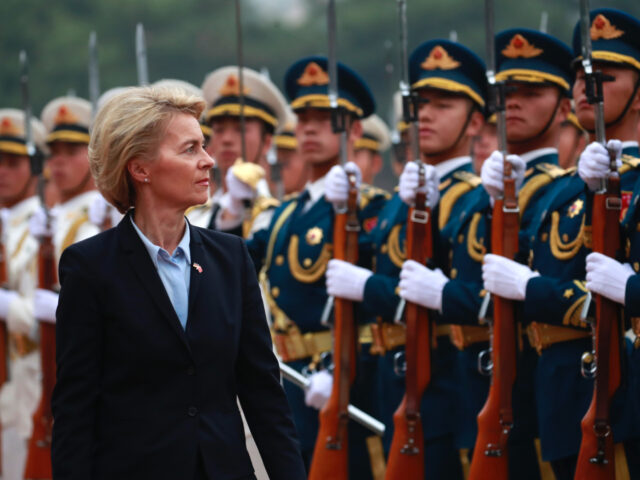The EU’s newly appointed ambassador to Beijing has argued that it is “essential” that Communist China “rules the world,” and that the bloc would support the “reunification” of the independent island of Taiwan with the mainland.
In an interview with the Spanish newspaper La Vanguardia, Spain’s former ambassador to Japan, Jorge Toledo Albiñana set out what appears to be the most friendly position towards the Chinese Communist Party from an EU diplomat in years, critically contradicting other statements on the sovereignty of Taiwan.
“The EU does not defend the independence of Taiwan, but the peaceful reunification. We believe that there should be only one China,” Albiñana said.
Given the newly appointed EU ambassador to Beijing also said that the bloc would not accept an invasion of the island by Communist China and would impose similar sanctions to those levied against Russia following the full-scale invasion earlier this year of Ukraine, it is unclear how such a “reunification” could occur given the fact that Taiwan has never been ruled by the CCP and maintains its own democratically elected government, military, currency, written language, and culture.
Responding to the comments, Taiwanese foreign ministry spokeswoman Joanne Ou said: “Taiwan has never been part of the People’s Republic of China. The sovereignty of Taiwan belongs only to all the people of Taiwan, and only the people of Taiwan can decide the future of Taiwan.
“It is also a peace-loving and mature democratic country and shares values of freedom, democracy and human rights with the European Union.”
The comments from the ambassador were also contradicted by EU Parliament Vice President Nicola Beer, who visited Taipei this week, one of the most senior EU figures to do so.
“Now is the moment to stand firm on the side of Taiwan,” Beer said, going on to describe Taiwan as a member of the “family of democracies”.
“Taiwan’s bloom is also Europe’s bloom. We won’t have a blind eye on China’s threats to Taiwan. Europe was late for Hong Kong, we won’t be late for Taiwan,” she said. “There is no room for Chinese aggression in democratic Taiwan. For the moment, we witness war in Europe; we do not want to witness war in Asia.”
While the EU put its massive trade deal with Beijing on hold following a series of tit-for-tat sanctions after European lawmakers condemned the “genocide” being committed against the Muslim Uyghurs and other ethnic minorities in the Western Xinjiang region of China, there have been calls from top Eurocrats to continue to engage with Beijing, including European Council President Charles Michel.
The newly appointed ambassador to Beijing appears to be in this faction, saying: “The EU and China are the world’s most important trading partners… That said, we are also competitors. But we do not have to fight, but rather negotiate so that European companies that export to China have the same conditions as Chinese companies that export to Europe, something that is not happening now.”
Albiñana went further saying that it is the EU sees China as a “partner” and that it is “essential and necessary to have China to rule the world,” adding that it will be important to work alongside Beijing on issues such as the Wuhan virus, the “climate crisis,” and the Iranian nuclear weapons programme.
“No, we do not ‘need China to rule the world’. Why are we sending an ambassador to negotiate our capitulation? It would be cheaper to send a white flag,” said Lithuanian MP Matas Maldeikis in response.
The Lithuanian lawmaker, who led a delegation of Baltic states to Taiwan last year, represents the hawkish side of the EU towards China, with his country angering Beijing by opening a de-facto Taiwanese embassy in the capital of Vilnius last year. In response, the CCP has imposed blockades on Lithuanian products and even products made in other EU nations with Lithuanian components in a bid to force the small nation into backing away from its support of Taiwan.
On the other side of the China argument in Europe is the industrial powerhouse of the bloc, Germany. Though the German government committed to looking to “diversify” trade away from the communist country following the release of the Xinjiang Files, which further documented the longstanding and systematic oppression of minorities in the Western region, it remains to be seen how they will manage this, given the economic shocks being experienced by German industry as a result of the over-reliance on Russian energy.
German industry has already been reported as having tried to pressure Lithuania to back down in its dispute with Beijing, and leading German brands such as Volkswagen, Hugo Boss, and BMW have deep ties with the country, even being accused of profiting from slave labour in Xinjiang.
Arguing against decoupling the European economy from China, the newly appointed ambassador said: “China’s exports to Europe continue to grow. Chinese foreign trade continues to grow. That is why the disengagement would cause a cataclysm. Despite the ongoing deglobalization, the world is tremendously intertwined. We depend on each other.”
Follow Kurt Zindulka on Twitter here @KurtZindulka

COMMENTS
Please let us know if you're having issues with commenting.